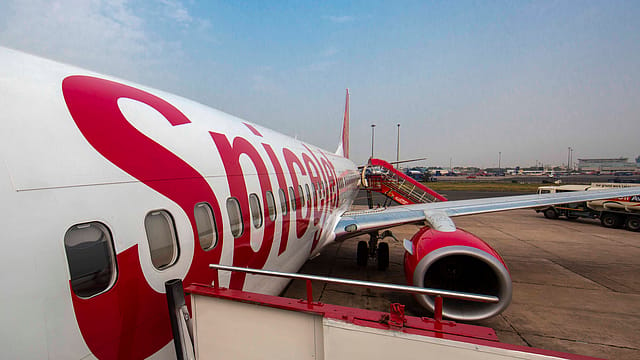SpiceJet stock surges 5% on plans to induct 10 Boeing 737 aircraft
ADVERTISEMENT

Budget airline SpiceJet Ltd saw its shares rise 4.67% after the Gurugram-based airline announced plans to induct 10 Boeing 737 aircraft into its fleet beginning September 2023. The scrip opened a gap-up at ₹28.55 today and soon rose to an intra-day high of ₹29.50. At the current share price, the market cap of the company stands at ₹1,758.59 crore.
In contrast, the Bombay Stock Exchange (BSE) benchmark Sensex is down 0.055% at 62,813.88, while Nifty is also down 0.055% at 18,624.35.
The aviation stock has seen a significant rally in the past week, surging 11.37% during the period. The shares of SpiceJet had surged as much as 8.3% on Thursday to hit an intraday high of ₹29 apiece on the BSE. However, the stock is down 25.03% in the year-to-date period; 27.08% in the past six-month period; and 5.26% in the past month.
SpiceJet said to cater to the increased passenger demand, it will induct 10 Boeing 737 aircraft into its fleet. “The airline has already signed a lease agreement for the ten planes which will start joining the fleet from September 2023. These ten B737s include five 737 Max aircraft,” said a SpiceJet statement.
The company has also said it is working on restoring and reviving its grounded aircraft, which will start returning back to service soon.
SpiceJet chairman Ajay Singh said there has been a significant surge in passenger demand and this trend is expected to continue in the latter part of the year as well. “Accordingly, SpiceJet has been planning capacity addition to cater to the growing needs of the Indian aviation market. We will be inducting ten B737 aircraft between September-October 2023.”
Singh said the induction of these planes, which coincides with the peak travel season in India, will help the company launch new routes and strengthen its presence on existing ones.
The company on Thursday also announced a partnership with the US-based commercial jet engines owner FTAI Aviation to restore the fleet under the CFM6 revitalisation programme. FTAI will provide SpiceJet with up to 20 engines for lease, inclusive of maintenance services.
This will provide SpiceJet access to a pipeline of available engines, which eliminates the need for frequent shop visits. The company says the first engines will be used to support the re-activation of SpiceJet's aircraft fleet over the next 2-3 months and will be critical for service on new routes.
Just last month, SpiceJet announced a substantial hike in the salary of its pilots, raising captains' salary to ₹7.5 lakh-a-month for 75 hours of flying, which has been applicable from May 16, 2023. Salaries of trainers (DE, TRI) and first officers have also been increased commensurately. Before that, SpiceJet had revised its salary structure to ₹7 lakh-a-month for 80 hours of flying.